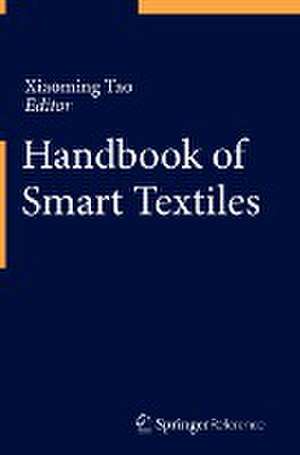Handbook of Smart Textiles
Editat de Xiaoming Taoen Limba Engleză Hardback – 16 sep 2015
Preț: 3411.53 lei
Preț vechi: 4488.86 lei
-24% Nou
Puncte Express: 5117
Preț estimativ în valută:
652.78€ • 683.40$ • 540.14£
652.78€ • 683.40$ • 540.14£
Carte tipărită la comandă
Livrare economică 01-07 aprilie
Preluare comenzi: 021 569.72.76
Specificații
ISBN-13: 9789814451444
ISBN-10: 9814451444
Pagini: 1000
Ilustrații: XX, 1063 p. 565 illus., 374 illus. in color.
Dimensiuni: 155 x 235 x 63 mm
Greutate: 2.23 kg
Ediția:1st ed. 2015
Editura: Springer Nature Singapore
Colecția Springer
Locul publicării:Singapore, Singapore
ISBN-10: 9814451444
Pagini: 1000
Ilustrații: XX, 1063 p. 565 illus., 374 illus. in color.
Dimensiuni: 155 x 235 x 63 mm
Greutate: 2.23 kg
Ediția:1st ed. 2015
Editura: Springer Nature Singapore
Colecția Springer
Locul publicării:Singapore, Singapore
Public țintă
ResearchNotă biografică
Prof. Tao is Chair Professor of Textile Technology, The Hong Kong Polytechnic University. She has a BEng in textile engineering and a PhD in textile physics. Prof. Tao is the past World President and the elected Fellow of the Textile Institute, elected Fellow of American Society of Mechanical Engineering and Fellow of the Royal Society of Arts, Design and Commercial Applications, UK. Prof. Tao is the Editor of international journal “Textile Progress” and serves on Editorial Board of more than 10 leading academic journals of the field.
Prof. Tao is a leading figure in “Smart textiles”, for her outstanding research work on nanotechnology, photonic fibres and fabrics, flexible electronic and photonic devices in the last 18 years. She founded the Hong Kong Nanotechnology Centre for Functional and Intelligent Textile and Apparel in 2004. Prof. Tao has conducted numerous research projects and published more than 600 scientific publications including over 200 international journal papers. She is recognized by ISI as one of the top 1% most cited materials scientists in the world. She published the world first monograph on smart textiles in 2001. Among some a dozen books published on this topic around the world, she has three. Prof. Tao has been invited to deliver plenary/keynote presentations in over 70 international conferences. Among over 20 awards received by Prof. Tao, the most prestigious ones include the Honorary Fellowship of Textile Institute in 2011, the highest individual award of the field.
Prof. Tao is a leading figure in “Smart textiles”, for her outstanding research work on nanotechnology, photonic fibres and fabrics, flexible electronic and photonic devices in the last 18 years. She founded the Hong Kong Nanotechnology Centre for Functional and Intelligent Textile and Apparel in 2004. Prof. Tao has conducted numerous research projects and published more than 600 scientific publications including over 200 international journal papers. She is recognized by ISI as one of the top 1% most cited materials scientists in the world. She published the world first monograph on smart textiles in 2001. Among some a dozen books published on this topic around the world, she has three. Prof. Tao has been invited to deliver plenary/keynote presentations in over 70 international conferences. Among over 20 awards received by Prof. Tao, the most prestigious ones include the Honorary Fellowship of Textile Institute in 2011, the highest individual award of the field.
A great lover of scientific discovery, Prof. Tao is also a prolific inventor of new technologies with 19 granted patents. Eight of the invented technologies have been licensed to companies worldwide for industrial applications. One of them has been used by 9 companies around the world and produced new textile and apparel products worth over 10.5 billion Hong Kong dollars. She started a company in 2011 with her PhD students to produce and market electronic textiledevices and systems under the trademark SoftceptorTM . Her photonic fabrics created by integrating science and arts together have been invited to exhibit in Tokyo Museum of Future and Hong Kong Art Museum.
Textul de pe ultima copertă
The “Handbook of Smart Textiles” aims to provide a comprehensive overview in the field of smart textile describing the state of the art in the research sector as well as the well-established techniques applied in industries. The handbook is planned to cover from fundamental theories, experimental techniques, characterization methods, as well as real applications with successful commercialized examples. The book is structured in a way in which it is appropriate for graduate students, PhD candidates, and professionals in diverse scientific and engineering communities devoted to relevant fields, including textile engineering, chemistry, bioengineering, material engineering, mechanical engineering, electrical engineering. The book will also provide a solid reference for industrial players who look for innovative technologies as well as environmental, safety concerns for the development of smart textile related products.
Caracteristici
Presents a comprehensive overview of smart textiles, from fundamental theory to real applications Supports students and academics through examples & exploration of experimental techniques Provides a working reference tool suitable for those in the smart textiles industry Collates leading expertise from diverse scientific and engineering communities Includes supplementary material: sn.pub/extras
